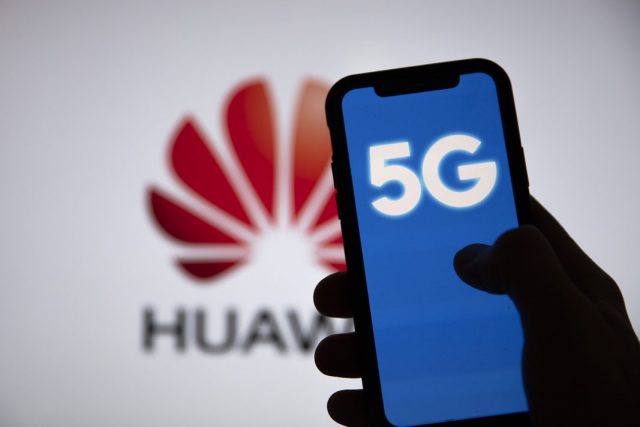The government will ban the UK’s mobile providers from buying new Huawei equipment after December 31, and they must also remove all existing Huawei equipment from their 5G networks by 2027.
The Secretary of State for Digital, Culture, Media and Sport, Oliver Dowden, announced the decision to the House of Commons on Tuesday afternoon. Existing Huawei equipment in 2G, 3G and 4G networks will not be required to be replaced and full-fibre broadband operators will be given two years to “transition” away from the purchase of Huawei hardware.
The move comes after the United States introduced rules requiring foreign microchip manufacturers using American chipmaking equipment to require a license before selling semiconductors to Huawei, a development that was seen as making it more likely that Huawei would be pushed into using less secure semiconductor suppliers.
Previous concerns over Huawei, which has links to the Chinese People’s Liberation Army and question marks over whether it is state owned, surrounded whether the Chinese state could install “backdoors” in Huawei equipment to enable mass surveillance of telephone conversations, emails and other digital communications over 5G networks.
Those concerns were considered largely unfounded by the UK intelligence services, leading to Boris Johnson’s government deciding to allow Huawei kit in the UK’s 5G network in January, capped at thirty-five per cent in the “core” network. The change in US trade policy led to this decision being reassessed and now all Huawei equipment will need to be stripped out by 2027 at the latest.
Conservative rebels were quick to criticise the timescale, with Sir Iain Duncan Smith describing the delay as unacceptable and calling for Huawei to be removed from the network by 2025. Rebel MPs have also argued that it needs to be taken out of the existing 3G and 4G network.
As many as 60 Tory MPs are prepared to rebel over Huawei and sign amendments to the Telecoms Infrastructure Bill later this year forcing the government to bring forward the 2027 date. The rebels said they are “confident” of defeating the government, which has a majority of 80 seats.
Mr Dowden admitted the Huawei ban could delay the full roll-out of British 5G networks by two years and add hundreds of millions of pounds to the costs.
Just hours before the decision was announced, John Browne, the Huawei UK chairman, said he would step down from the position in September. Lord Browne, who ran BP from 1995 to 2007, has been in the post for five years and is Huawei’s first independent chairman.
Ed Brewster, a spokesperson for Huawei, called the decision “disappointing”, saying it would “move Britain into the digital slow lane” and refuted suggestions that the new US policy would have made Huawei equipment less secure: “Instead of ‘levelling up’ the government is levelling down and we urge them to reconsider. We remain confident that the new US restrictions would not have affected the resilience or security of the products we supply to the UK.
“Regrettably our future in the UK has become politicised; this is about US trade policy and not security. Over the past 20 years, Huawei has focused on building a better-connected UK. As a responsible business, we will continue to support our customers as we have always done.
“We will conduct a detailed review of what today’s announcement means for our business here and will work with the UK government to explain how we can continue to contribute to a better-connected Britain.”
The 5G decision represents a strategic victory for the US president, Donald Trump, whose administration has been urging Boris Johnson to kick Huawei out of Britain on security grounds for months.
UK officials however insisted that the decision was taken on “purely technical” grounds and was not the result of pressure from the White House. The Tory China Research Group, including former party leader Iain Duncan Smith, had urged Mr Johnson to remove Huawei from the 5G network by 2023, a timetable deemed unrealistic by the telecoms industry.
The decision will also further strain relations between London and Beijing after Mr Johnson angered the Chinese leadership earlier in the month by offering UK citizenship to up to 3 million Hong Kong citizens with British overseas passports.
Chinese investment is widespread in the UK economy, from train companies to the nuclear power sector. The Chinese ambassador to the UK said this month that Britain’s actions were being scrutinised for evidence that it could not run its foreign policy independently of the US.
“The China business community are all watching how you handle Huawei. If you get rid of Huawei it sends out a very bad message to other Chinese businesses,” Liu Xiaoming said. “We want to be your friend. We want to be your partner. But if you want to make China a hostile country, you will have to bear the consequences.”
Julian David, CEO of techUK, said of the decision: “High quality and resilient 5G networks are essential to supercharge a levelled-up economic recovery. Today’s decision, particularly on the timeframes, strikes the right balance between resilience and ensuring that the UK can maintain its position as a 5G leader.
“Pace is now key; the faster we can deploy these networks, the faster our regions, businesses and consumers can benefit from the step-change that 5G can deliver.
“Therefore, the government must ensure that it makes strategic and ambitious investments into OpenRAN technology and a National Telecoms Lab to diversify the telecoms supply base and continue to seek the best that global technology can offer.”
According to Neil Campling, head of TMT at Mirabaud Securities, 5G providers in the UK, in particular Vodafone, will not be derailed by the removal of Huawei equipment.
“Vodafone has said it would cost billions to rip out and replace Huawei and it would delay the rollout of 5G,” he said. “Andrea Dona [Vodafone UK’s head of networks] said a Huawei ban would cost Vodafone ‘low-single-figure billions’ to swap out its thousands of Huawei stations and antennas across the country, according to Bloomberg. This certainly feels like an exaggeration.”
“In February 2019, Vodafone had decided to pause any further developments of Huawei in the core across Europe. The company had decided to replace Huawei in the areas deemed sensitive, such as the core, across Europe over a five-year timeframe, at a cost of approximately €200 million. Vodafone have long argued for understanding the distinction between sensitive core and non-sensitive RAN (radio access networks).
“Industry returns are low, and Vodafone has said it cannot simply justify a large acceleration of [capital expenditure] to swap out modern 4G networks. This would lead to a delay for 5G rollouts. The idea ripping out Huawei in the UK would cost billions and billions seems sensationalist and perhaps, politically charged. Overall, today’s statement is a watered-down risk relative to expectations and Vodafone is well positioned to navigate its way around policy changes.”
14th July 2020.









